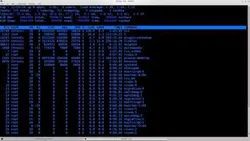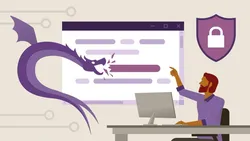
The Complete Kali Linux Course: Beginner to Advanced! w&English Subtitles 
This course is designed to teach you the basics of Kali Linux, from installation and configuration to leveraging its powerful tools. You will learn how to install VirtualBox, set up a virtual machine, and install Kali Linux. You will also learn basic terminal commands, dark web browsing, staying anonymous, network footprinting, WiFi cracking, SSL stripping, ARP spoofing, social engineering, website cloning, SQL injections, password cracking, and deploying backdoors. This course is perfect for beginners to advanced users looking to gain a comprehensive understanding of Kali Linux. ▼
ADVERTISEMENT
Course Feature
![]() Cost:
Cost:
Free
![]() Provider:
Provider:
Youtube
![]() Certificate:
Certificate:
Paid Certification
![]() Language:
Language:
English
![]() Start Date:
Start Date:
On-Demand
Course Overview
❗The content presented here is sourced directly from Youtube platform. For comprehensive course details, including enrollment information, simply click on the 'Go to class' link on our website.
Updated in [May 25th, 2023]
This course is perfect for anyone who wants to learn the basics of Kali Linux and become an advanced user. It is suitable for both beginners and experienced users, as it covers all the essential topics in detail. It is also great for those who want to learn more about ethical hacking and penetration testing. The course is taught by an experienced instructor who will guide you through each step of the way. With English subtitles, you can easily follow along and understand the concepts. By the end of the course, you will have a solid understanding of Kali Linux and be able to use it to its full potential.
[Applications]
Upon completion of this course, students will have a comprehensive understanding of the Kali Linux operating system and its powerful tools. They will be able to use these tools to perform network footprinting, WiFi cracking, SSL stripping, ARP spoofing, social engineering, website cloning, SQL injections, password cracking, and deploying backdoors. Students will also be able to browse the dark web anonymously and securely. This course is ideal for anyone interested in learning the basics of Kali Linux and its powerful tools.
[Career Paths]
Recommended Career Paths:
1. Cyber Security Analyst: Cyber security analysts are responsible for protecting an organization’s computer systems and networks from cyber threats. They use a variety of tools and techniques, such as Kali Linux, to identify and mitigate potential security risks. They also develop and implement security policies and procedures, and monitor networks for suspicious activity. As the demand for cyber security professionals continues to grow, the job outlook for this position is very positive.
2. Penetration Tester: Penetration testers use Kali Linux to identify and exploit vulnerabilities in an organization’s systems and networks. They use a variety of tools and techniques to identify and exploit weaknesses in an organization’s security posture. This position requires a deep understanding of network security and the ability to think like an attacker.
3. Network Administrator: Network administrators are responsible for maintaining and managing an organization’s computer networks. They use a variety of tools and techniques, such as Kali Linux, to configure, monitor, and troubleshoot networks. As the demand for network administrators continues to grow, the job outlook for this position is very positive.
4. Ethical Hacker: Ethical hackers use Kali Linux to identify and exploit vulnerabilities in an organization’s systems and networks. They use a variety of tools and techniques to identify and exploit weaknesses in an organization’s security posture. This position requires a deep understanding of network security and the ability to think like an attacker.
[Education Paths]
1. Bachelor of Science in Cybersecurity: This degree path focuses on the technical aspects of cybersecurity, such as network security, cryptography, and digital forensics. It also covers topics such as risk management, incident response, and ethical hacking. This degree is becoming increasingly popular as the demand for cybersecurity professionals grows.
2. Master of Science in Information Security: This degree path focuses on the management aspects of cybersecurity, such as policy development, risk assessment, and security architecture. It also covers topics such as data privacy, legal compliance, and security operations. This degree is becoming increasingly popular as organizations look to hire professionals with the skills to manage their security operations.
3. Doctor of Philosophy in Cybersecurity: This degree path focuses on the research aspects of cybersecurity, such as developing new security technologies and analyzing existing ones. It also covers topics such as security protocols, secure software development, and secure system design. This degree is becoming increasingly popular as organizations look to hire professionals with the skills to develop and analyze new security technologies.
4. Certificate in Cybersecurity: This degree path focuses on the practical aspects of cybersecurity, such as network security, cryptography, and digital forensics. It also covers topics such as risk management, incident response, and ethical hacking. This degree is becoming increasingly popular as the demand for cybersecurity professionals grows.
Course Provider

Provider Youtube's Stats at AZClass
Discussion and Reviews
0.0 (Based on 0 reviews)
Explore Similar Online Courses

Cognitive Behavioral Therapy CBT Life Coaching Certification

Automating Networks with Ansible the Right Way

Python for Informatics: Exploring Information

Social Network Analysis

Introduction to Systematic Review and Meta-Analysis

The Analytics Edge

DCO042 - Python For Informatics

Causal Diagrams: Draw Your Assumptions Before Your Conclusions

Whole genome sequencing of bacterial genomes - tools and applications

Learning Kali Linux

Learning Kali Linux on Windows

Learning Kali Linux
 Related Categories
Related Categories
 Popular Providers
Popular Providers
 Popular Searches
Popular Searches
Quiz
 Submitted Sucessfully
Submitted Sucessfully
1. What is the name of the course?
2. What is the main purpose of the course?
3. What is the name of the tool used for WiFi cracking and signal jamming?
4. What is the name of the tool used for website cloning?
Correct Answer: SEToolkit


Start your review of The Complete Kali Linux Course: Beginner to Advanced! w&English Subtitles